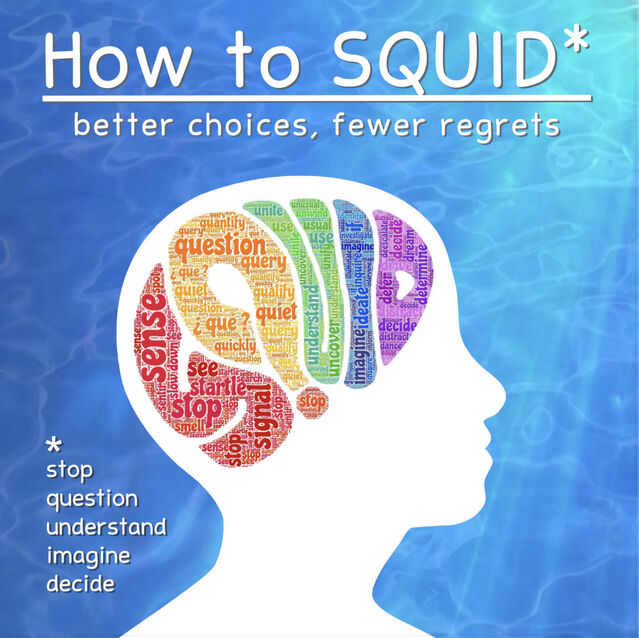Mindfulness
Humanity at Our Best, Pinecones, and How to SQUID
5 Steps for "Heroic Mindfulness" when we need it most.
Posted June 27, 2022 Reviewed by Gary Drevitch
Key points
- Needless suffering is global. Today we still see humanity at its worst, with people intentionally harming "others."
- People around the world are overcoming the bystander effect with heroic choices.
- The key to hope is upgrading our mindsets. We can notice problems we can help solve and then take action.

In August 1971, just over 50 years ago, I became well-known globally for creating the Stanford Prison Experiment. We randomly assigned roles of guard or prisoner to our participants, male college students. The guards worked 8-hour shifts. It was just a job to them. But the prisoners lived in our simulated prison 24/7. Within a few days, the guards became cruel and sadistic toward the prisoners, who reacted passively and began to have emotional breakdowns.
It was the sanity of Christina Maslach that brought me to my right mind and motivated me to end the experiment early. She was horrified by what she saw going on when she came to visit. And she had the courage to openly challenge my authority. Thanks to her heroic action, I terminated the experiment early. Inspired by Christina’s heroic response, I began the Heroic Imagination Project, training youth to become Everyday Heroes, as part of my desire to foster positive change in human behavior.
And yet in our current times, evil continues to impact our humanity. In our media feeds we see young Russian soldiers, persuaded to dehumanize, abuse, and kill their Ukrainian kin. Even those who never wanted to engage in such horrific behaviors are trapped in their roles. They obey their commanders, who are mired in the need to be obedient to their own leaders.
Here in the United States, we have news of the most recent mass shootings, in Uvalde, Buffalo, elsewhere. Around the world, there are still many people who choose to harm and destroy others. Friends and families of victims also suffer.
Beyond what we see in the news we know this brutality continues even as we try to teach young people the universal benefits of humane behavior and compassionate respect for others.
Still, I have hope that our angelic side will win over our dark evil side.
Dr. Mel Ganus and Łukasz Garczewski are part of my hopes, along with many more of you, doing the heroic work you do. We want to work together to change the systems and habits that lead people to be so inhumane. We can live in a kinder, saner world. But we need to know how to make better choices. We need you to step up and join us.
Humanity at Our Best: Caring for Strangers
Łukasz Garczewski: I, too, have hope. A stalwart, unyielding kind of hope that comes from witnessing what is possible. I live in Poznan, Poland. For 83 years, Poland has been living in peace. War at our borders seemed to be forever in our past, and refugees from a neighboring state an impossibility. Then came Vladimir Putin’s shocking invasion and the bombing of Ukraine, our neighboring country.
As of June 16, 2022, the UN estimates more than 13 million Ukrainians have fled their homes. More than 8 million Ukrainian refugees have crossed into neighboring countries. More than 4 million have crossed the border into Poland, and many are still here.
Millions of spontaneous acts of kindness occurred in complete solidarity and with seamless collaboration. I have witnessed the many Poles who have humanely provided help to exhausted refugees. From the first days of the war, Poles drove to the border and beyond to pick up overwhelmed women and children and take them to safety. Others prepared tea and food to hand out at train stations. Some Poles have invited refugees into their homes, where they still reside. Others have helped Ukrainians in need look for jobs or organized transport to their relatives in Western Europe.
I am in awe of the compassion and commitment my fellow Poles have displayed, proving that universal, unconditional compassion is possible. But it is fragile. As the weeks have passed, more volunteers have burned out. Families who took entire refugee families under their roof are struggling to adjust to this new life. Even as local authorities and the central government provide basic financial support to refugees, some have started asking, “How much will all this cost us?”
We need systems and methods that humanize and support all people, not only those who look like us. We need upgraded perspectives and tools, including tools of the mind—tools like SQUID.
Pinecones and SQUID: We Can All Be Heroes
Mel Ganus: Our world is on fire, metaphorically and literally. Globally, the number of people suffering has risen. And yet, I too have hope.
From ancient times wildfires have destroyed forests. As the fires burn, pinecones, sealed tight until heated, then burst open to spread their seeds, giving rise to new trees which grow in the wake of the destruction.
Never in our lives have we seen so many people around the world moving into heroic action, caring for others and for this precious planet. We are the pinecones, bursting with potential in the midst of the apocalypse.
Yes, evils today continue to dehumanize, harm, and destroy too many. But our kind natures exist within us, capable of springing up to help make the world a better, saner place. We can all help step up in small or big ways when we choose to do so.
What prompts us to take action and show kindness? What triggers our compassion and willingness to care for others when we would normally prefer to keep to ourselves and not get involved? Most people have never heard of the Bystander Effect, but we all experience it, often unconsciously, especially when there’s a diffusion of responsibility. We have to wake up to the opportunities we have to make better choices in those moments when we can help.
None of us can help all the time. But we can develop habits for being more aware of situations, questioning ourselves, and making more considered choices. We can choose to see every person as a fellow human being, valuable and worthy of consideration, even when we don’t know if and how to help. We can all learn to consider our choices, then more often choose to help others when we can. We can be the pinecones we wish to see in the world.
Phil Zimbardo: One way to break the bystander effect is to never allow ourselves to be drawn totally into every situation. Part of our response should begin with an analysis of the situation, understanding what is happening, including understanding what part our emotions and past experiences play in our interpretations. Should we intervene? Or just leave? When we are unaware that we are embedded in a social situation, our reactions can change into various forms of detachment and inaction.
Mel Ganus: Learning how to SQUID is one of our best training methods to achieve such goals. Now we invite you to try it. Five simple steps can trigger mindfulness and consideration of others when we most need to. The key to unlocking our personal heroism starts with noticing that something seems wrong, then examining what’s going on. Therefore, we must remember to stay mindful. Whenever we feel like something is wrong, can we...
- S-Stop to ask
- Q-Questions to better
- U-Understand? Can we
- I-Imagine our choices, then
- D-Decide on a plan?
... and finally, to act wisely.
We can all learn how to SQUID, and become one of the pinecones in today’s world. We can find hope for the future.
Every day we each have opportunities to become everyday heroes. We each have choices, in every moment, to evaluate any situation and determine if we might be able to help. Our actions may trigger others to work in harmony to help make a difference. This is humanity at our best.
We still have hope. We still fervently believe that the best is yet to come. Please come join us, as pinecones and SQUIDminders, and let’s work together to build a better world. We would love to hear from you.
We would like to thank our other contributors to this post: Dr. Zanna Smith, William de Melo, and Stacey Quigley.
References




